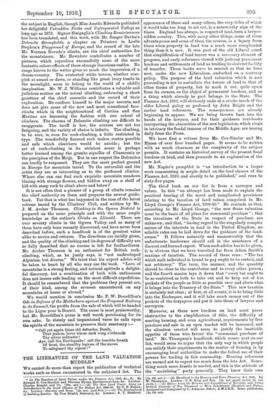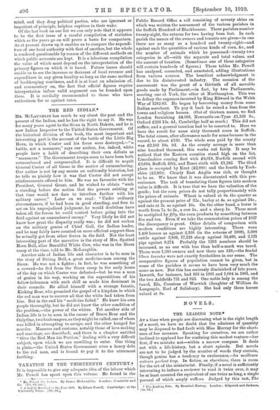THE LITERATURE OF THE LAND VALUATION MUDDLE .* WE cannot
do more than report the publication of technical works such as those enumerated in the subjoined list. The • (1) The Taxation of Land Values under the Finance Act, 1810, lc. By Edward S. Cox-Sinclair and Thomas Hynes, Barristers-at-Law, &e. London Charles Knight and Co. (10s. net.]—(2) The Hew Land Taxes : being an Introduction to the Land Clauses of the Budget Act, 1909-10. By T. B. Napier, Sc. London: Stevens and Sons. [2s. net, post-free.]—(3) The Development of Building Estates. By Tom Bright, Surveyor, Sc. London : B. T. Botsford.
appearance of these and many others, the very titles of which it would take too long to set out, is a noteworthy sign of the times. England has always, in respect of land, been a lawyer- ridden country. This, with many other things, some of them advantageous and some of them the reverse, is a legacy from times when property in land was a much more complicated thing than it is now. It was part of the old Liberal creed that simplification of land tenure was a necessary element of progress, and early reformers viewed with jealousy permanent burdens and settlements of land as tending to obstruct facility of transfer. These books serve to remind us that we have now, under the new Liberalism, embarked on a contrary policy. The purpose of the land valuation which is now proceeding is not to assimilate the tenure of land to that of other forms of property, but to mark it out, quite apart from its owners, as the object of permanent burdens, and as a thing which already in part belongs to the State. The Finance Act, 1910, will obviously undo at a stroke much of the older Liberal policy as professed by John Bright and the earlier land reformers. The consequences are already beginning to appear. We are being thrown back into the hands of the lawyers, and for their guidance text-books interpreting the obscurities of the new legislation, which rivals in intricacy the feudal tenures of the Middle Ages, are issuing daily from the Press.
We have first a volume from Mr. Cox-Sinclar and Mr. Hynes of over four hundred pages. It seems to be written with as much clearness as the complexity of the subject permits. It contains an historical survey of the present fiscal burdens on land, and then proceeds to an explanation of the new Act.
Mr. Napier's pamphlet is " an introduction to a larger work commenting in ample detail on the land clauses of the Finance Act, 1910, and shortly to be published," and runs to sixty-five pages.
The third book on our list is from a surveyor and valuer. In this " an attempt has been made to explain the practical bearing of the novel and complicated provisions relating to the taxation of land values comprised in Mr. Lloyd George's Finance Act, 1909-10." He reminds us that, according to Mr. Lloyd George, " the new State valuation must be the basis of all plans for communal purchase "; that the intentions of the State in respect of purchase are unknown; and that, "having regard to the singularly complex nature of the interests in land in the United Kingdom, no reliable rules can be laid down for the guidance of the land- owner." It follows naturally and unanswerably that the unfortunate landowner should call in the assistance of a discreet and learned expert. When such advice has to be given, it is obvious that we have travelled far from Adam Smith's
maxims of taxation. The second of these runs : " The tax which each individual is bound to pay ought to he certain, and not arbitrary." The term, the manner, and the quantity should be clear to the contributor and to every other person ; and the fourth maxim lays it down that " every tax ought to be so contrived as both to take out and to keep out of the pockets of the people as little as possible over and above what it brings into the Treasury of the State." This new taxation is certainly not clear; at first, at all events, it is to bring little into the Exchequer, and it will take much money out of the pockets of the taxpayers and put it into those of lawyers and surveyors.
Moreover, as these new burdens on land must prove obstructive to the simplification of title, the difficulty of meeting housing, and even agricultural, requirements by free purchase and sale in an open market will be increased, and the situation created will seem to justify the insatiable appetite of those who favour the "communal purchase of land." Mr. Thompson's handbook, which comes next on our list, would seem to argue that the only way in which people can satisfy their requirements in the matter of housing is by encouraging local authorities to make the fullest use of their powers for trading in this commodity. _ Housing reformers are warned not to expect too much from the late Act. Some- thing much more drastic is needed, and this is the attitude of the " socialising " party generally. They know their own
Les. 6d. net.]—(4) Handbook to the 'lousing and Town Planning Act, 1806. By W. Thompson. London : P. S. Sing and Son. [is. net paper cover, 2s. net cloth.]—(5) Rates: being the Revenue and Expenditure of Boroughs and Urban District Councils of Ten Thousand or More Inhabitants (England and Wales). Analysed and Compared by C. Ashmore Baker, A.M.LE.E. Same publishers. 12s. 6d. net.
mind, and they drag political parties, who are ignorant or impatient of principle, helpless captives in their wake.
Of the last book on our list we can only note that it appears to be the first issue of a careful compilation of statistics which as the years go on will prove a basis for comparison. As at present drawn up it enables us to compare the expendi- ture of one local authority with that of another, but the whole is rendered questionable by reason of the different methods on which public accounts are kept. It is a laborious compilation the value of which must depend on the interpretation of the primary figures on which it is based. Future issues should enable us to see the increase or decrease of local revenue and expenditure in any given locality so long as the same method of bookkeeping continues, and it is at least an admission of, and commentary on, the fact that official figures require interpretation before valid argument can be founded upon them. It is cordially recommended to those who have enthusiasm for or against rates.







































 Previous page
Previous page